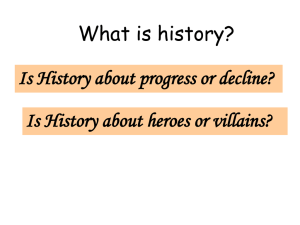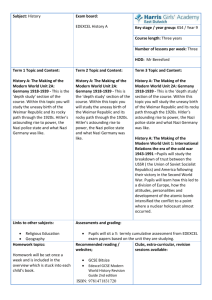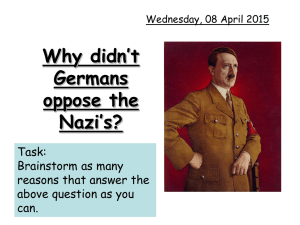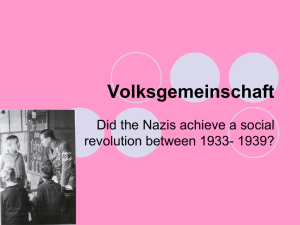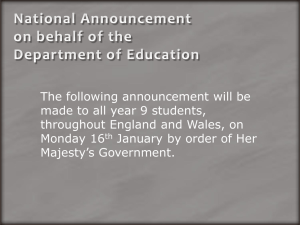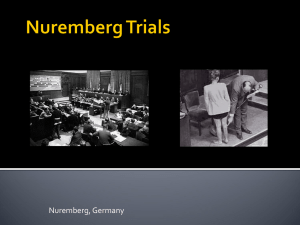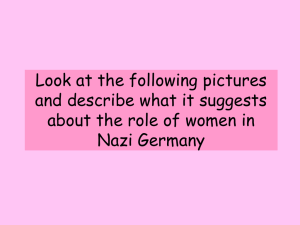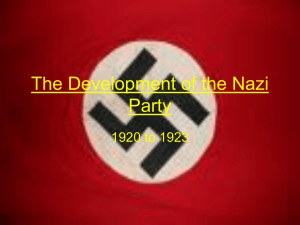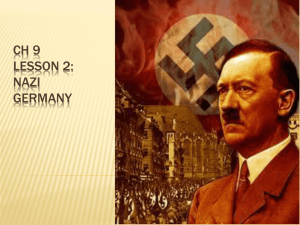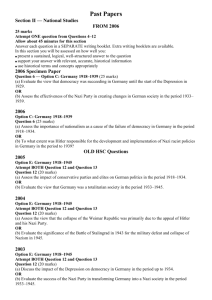History GCSE Overview Document
advertisement
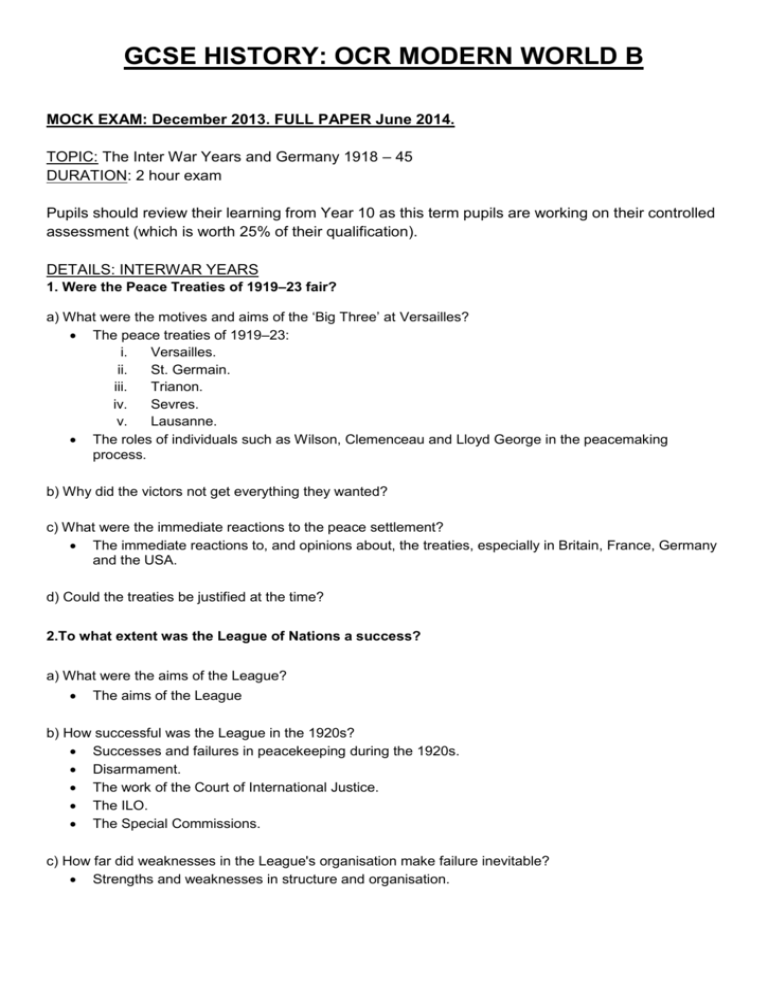
GCSE HISTORY: OCR MODERN WORLD B MOCK EXAM: December 2013. FULL PAPER June 2014. TOPIC: The Inter War Years and Germany 1918 – 45 DURATION: 2 hour exam Pupils should review their learning from Year 10 as this term pupils are working on their controlled assessment (which is worth 25% of their qualification). DETAILS: INTERWAR YEARS 1. Were the Peace Treaties of 1919–23 fair? a) What were the motives and aims of the ‘Big Three’ at Versailles? The peace treaties of 1919–23: i. Versailles. ii. St. Germain. iii. Trianon. iv. Sevres. v. Lausanne. The roles of individuals such as Wilson, Clemenceau and Lloyd George in the peacemaking process. b) Why did the victors not get everything they wanted? c) What were the immediate reactions to the peace settlement? The immediate reactions to, and opinions about, the treaties, especially in Britain, France, Germany and the USA. d) Could the treaties be justified at the time? 2.To what extent was the League of Nations a success? a) What were the aims of the League? The aims of the League b) How successful was the League in the 1920s? Successes and failures in peacekeeping during the 1920s. Disarmament. The work of the Court of International Justice. The ILO. The Special Commissions. c) How far did weaknesses in the League's organisation make failure inevitable? Strengths and weaknesses in structure and organisation. d) How far did the Depression make the work of the League more difficult? The impact of the world Depression on the work of the League after 1929. e) Why did the League fail over Manchuria and Abyssinia? The failures of the League in Manchuria and Abyssinia 3. Why had international peace collapsed by 1939? a) What were the long-term consequences of the peace treaties of 1919–23? b) What were the consequences of the failures of the League in the 1930s? The collapse of international order in the 1930s. The increasing militarism of Germany, Italy and Japan. c) How far was Hitler's foreign policy to blame for the outbreak of war in 1939? The Saar Remilitarisation of the Rhineland Austria Czechoslovakia Poland d) Was the policy of appeasement justified? e) How important was the Nazi–Soviet Pact? f) Why did Britain and France declare war on Germany in September 1939? DETAILS: GERMANY 1918 – 1945 1. Was the Weimar Republic doomed from the start? a) How did Germany emerge from defeat in the First World War? The Revolution of 1918–19. The establishment of the Republic. b) What was the economic and political impact of the Treaty of Versailles on the Weimar Republic? The impact of the Treaty of Versailles on German politics and the German economy. The Weimar Constitution. The political disorder of 1920–23. Economic distress and hyperinflation. The occupation of the Ruhr. c) To what extent did the Republic recover after 1923? The Stresemann era – recovery at home and abroad. The underlying weaknesses of the Republic. d) What were the achievements of the Weimar period? 2. Why was Hitler able to dominate Germany by 1933? a) What did the Nazi Party stand for in the 1920s? The early years of the Nazi Party. Nazi ideas and methods. b) Why did the Nazis have little success before 1930? The Munich putsch. The roles of Hitler and other Nazi leaders. The change of tactics after the putsch. c) Why was Hitler able to become Chancellor by 1933? The impact of the Depression on Germany. The political, economic and social crisis of 1930–33. Reasons for growing support for the Nazis. The election results 1928–33. How Hitler became Chancellor in 1933. d) How did Hitler consolidate his power in 1933? The Reichstag Fire. Hitler's use of emergency powers. The Enabling Act of 1933. 3. The Nazi regime: how effectively did the Nazis control Germany, 1933–45? a) How much opposition was there to the Nazi regime? Opposition to Nazi rule: i. The Communists. ii. Church leaders. iii. Passive resistance. iv. Youth groups. v. Growing opposition during the war including from within the army. b) How effectively did the Nazis deal with their political opponents? The nature of Nazi rule in Germany. The Night of the Long Knives. The death of Hindenburg. Removal of opposition. Methods of control and repression. The roles of the SS and the Gestapo. c) How did the Nazis use culture, propaganda and the mass media to control the people? The use of culture, propaganda and the mass media. d) Why did the Nazis persecute many groups in German society? Persecution of the Jews and the Final Solution. Persecution of other minorities. 4. The Nazi regime: what was it like to live in Nazi Germany? a) What was the purpose of the Hitler Youth? The Hitler Youth and the League of German Maidens. b) How successful were Nazi policies towards women and the family? The aims and development of Nazi policies towards women and the family. c) Were most people better off under Nazi rule? The effectiveness of German economic policies. d) How did the coming of war change life in Germany? Rearmament. The impact of the Second World War on the lives of the German people. The conversion to war economy. BRITISH DEPTH STUDY: How was British Society changed, 1890 – 1918? FULL PAPER June 2014 What were the working and living conditions like for the poor in the 1890s? Poverty and distress in the 1890s. The work and impact of Charles Booth and Seebohm Rowntree. How were social reformers reacting to the social problems of the 1890s? Why did the Liberal government introduce reforms to help the young, old and unemployed? Reasons for the liberal victory in the 1906 election. Reasons for the liberal reforms, e.g.: i. The extent of poverty. ii. New liberalism. iii. iv. The roles of Lloyd George and Churchill. The threat from the recently formed Labour Party. How effective were these reforms? The Children’s Charter, including compulsory medical inspections in schools, free medical treatment and free school meals for the poor. The establishment of juvenile courts and borstals. Old age pensions, 1909. Labour exchange, 1909. The National Insurance Act 1911. Attempts to reform the poor law. What was the social, political and legal position of women in the 1890s? What were the arguments for and against female suffrage? How effective were the activities of the suffragists and the suffragettes? The campaign to win women the vote. Millicent Fawcett and the founding of the National Union of Women’s Suffrage Societies (NUWSS) in 1897. The Pankhursts and the founding of the Women’s Social and Political Union (WSPU) in 1903. The leaders’ tactics and activities of the two groups, including the use of violence. The effectiveness of the different tactics and the reactions of the authorities, including Lloyd George and Asquith. The attempts to get a bill for women’s suffrage through Parliament. The situation regarding votes for women in 1914. How did women contribute to the war effort? Women in employment. What happened to the issue of votes for women during the war? The 1918 Representation of the People Act. How were civilians affected by the war? Recruiting in the early years of the war. New Government powers: i. ii. iii. The Defence of the Realm Act 1914 Conscription Rationing. How effective was government propaganda during the war? The use of propaganda Why were some women given the vote in 1918? What was the attitude of the British people at the end of the war towards Germany and the Paris Peace Conference? The mood of the British people at the end of the war. The different attitudes about what should happen to Germany.
